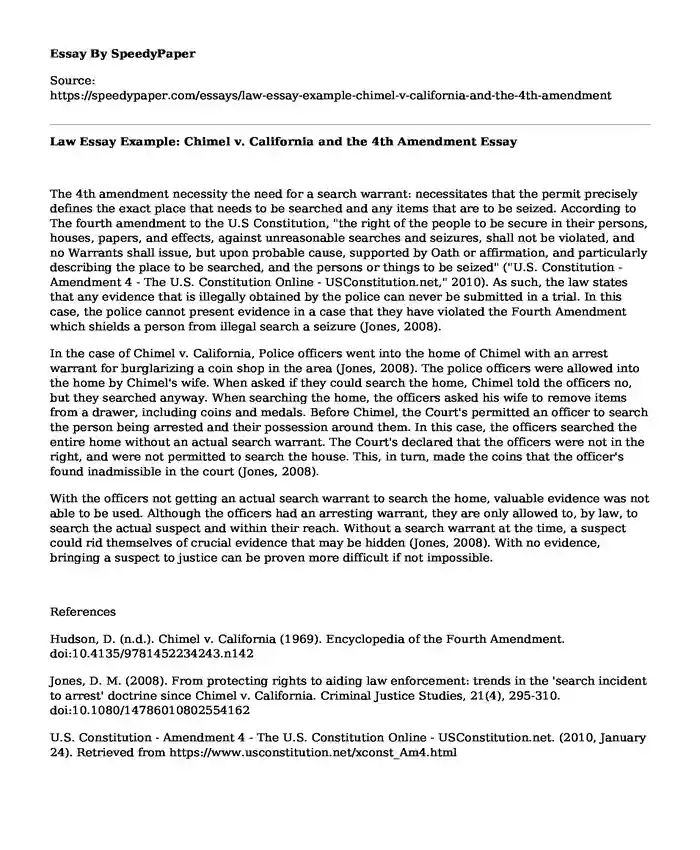
| Type of paper: | Essay |
| Categories: | Police Constitution |
| Pages: | 2 |
| Wordcount: | 448 words |
The 4th amendment necessity the need for a search warrant: necessitates that the permit precisely defines the exact place that needs to be searched and any items that are to be seized. According to The fourth amendment to the U.S Constitution, "the right of the people to be secure in their persons, houses, papers, and effects, against unreasonable searches and seizures, shall not be violated, and no Warrants shall issue, but upon probable cause, supported by Oath or affirmation, and particularly describing the place to be searched, and the persons or things to be seized" ("U.S. Constitution - Amendment 4 - The U.S. Constitution Online - USConstitution.net," 2010). As such, the law states that any evidence that is illegally obtained by the police can never be submitted in a trial. In this case, the police cannot present evidence in a case that they have violated the Fourth Amendment which shields a person from illegal search a seizure (Jones, 2008).
In the case of Chimel v. California, Police officers went into the home of Chimel with an arrest warrant for burglarizing a coin shop in the area (Jones, 2008). The police officers were allowed into the home by Chimel's wife. When asked if they could search the home, Chimel told the officers no, but they searched anyway. When searching the home, the officers asked his wife to remove items from a drawer, including coins and medals. Before Chimel, the Court's permitted an officer to search the person being arrested and their possession around them. In this case, the officers searched the entire home without an actual search warrant. The Court's declared that the officers were not in the right, and were not permitted to search the house. This, in turn, made the coins that the officer's found inadmissible in the court (Jones, 2008).
With the officers not getting an actual search warrant to search the home, valuable evidence was not able to be used. Although the officers had an arresting warrant, they are only allowed to, by law, to search the actual suspect and within their reach. Without a search warrant at the time, a suspect could rid themselves of crucial evidence that may be hidden (Jones, 2008). With no evidence, bringing a suspect to justice can be proven more difficult if not impossible.
References
Hudson, D. (n.d.). Chimel v. California (1969). Encyclopedia of the Fourth Amendment. doi:10.4135/9781452234243.n142
Jones, D. M. (2008). From protecting rights to aiding law enforcement: trends in the 'search incident to arrest' doctrine since Chimel v. California. Criminal Justice Studies, 21(4), 295-310. doi:10.1080/14786010802554162
U.S. Constitution - Amendment 4 - The U.S. Constitution Online - USConstitution.net. (2010, January 24). Retrieved from https://www.usconstitution.net/xconst_Am4.html
Cite this page
Law Essay Example: Chimel v. California and the 4th Amendment. (2022, Jun 08). Retrieved from https://speedypaper.net/essays/law-essay-example-chimel-v-california-and-the-4th-amendment
Request Removal
If you are the original author of this essay and no longer wish to have it published on the SpeedyPaper website, please click below to request its removal:
- Free Essay in Hospitality Management
- Healthcare Reform Paper Example
- Blade Runner 2049 - Essay Sample with Film Review
- "North and South" by Elizabeth Gaskell Essay Sample
- Essay Example on the Iconoclastic Controversy
- Proposal Policy for the Purpose of Marijuana - Paper Example
- Essay Sample: Cloud-Application Service
Popular categories




